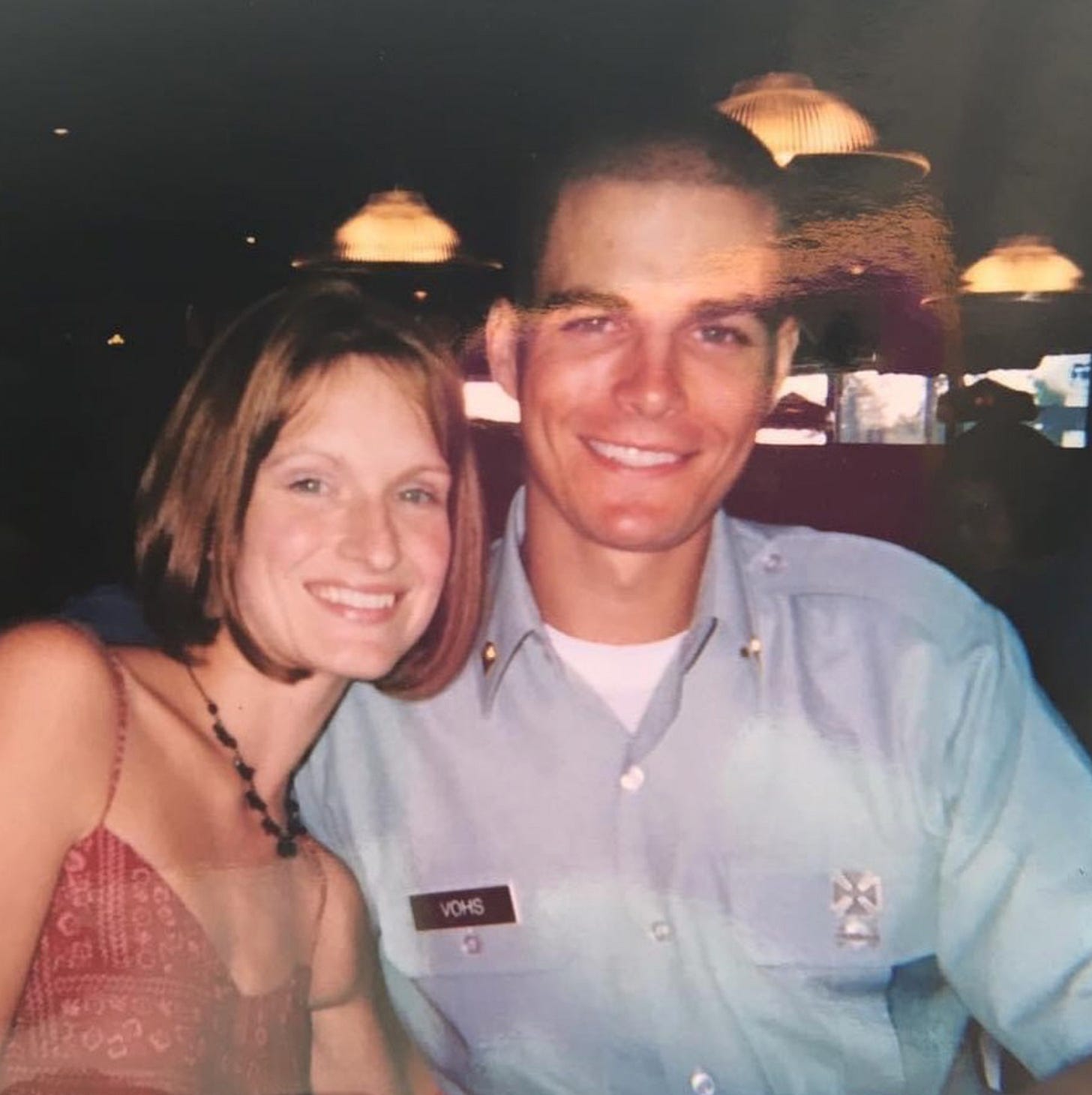Note: This post is made for listening :) but I’m including the transcript if that is not your jam.
TRANSCRIPT
[00:00:00] Hey there. I wanted to follow up on my other note about one of two things leaders are responsible for. The second one is compensation. And there's a whole lot to unpack there, so let's try to do it through a little bit of a story. I'm going to answer a question I get all the time, and that's “why did you join the army?”
[00:00:18] And the reason is pretty simple, it was about compensation.
Why did I join the army?
[00:00:22]
Let's go back 20 years, and it's 9/11. I remember very clearly where I was maybe like, most of you. I was at The Breakers, which is a posh hotel in Palm Beach, Florida.
That Tuesday morning, I found myself in a meeting room getting ready to give a presentation on a new piece of software. News started to trickle in that something had happened in New York and it wasn't clear how bad it was.
More information would come and we'd realize that something horrific had happened.
[AUDIO CLIP]
It was a very emotional day for everyone, and we'd spend the balance of it huddled around the TV, listening and trying to learn what was going on? I'm trying to understand what was happening in new Yorkers, what would happen to our country, and what our future would be like? What we did know is it was all going to be very different.
A Decision
A couple of days later, I woke up and I made a decision. Channeling a very famous scene from the movie Patton and my grandfather, I decided that I wanted to join the Marine Corps. In fact, I wanted to be a pilot. So I marched down to the Marine Corps recruiting office and I started that process.
Over the course of the next few months, and a lot of tests and a lot of things, the Marine Corps told me that I wasn't cut out to do that. They wanted me to be an infantry officer and that's not what I wanted. I think if I look back, it was purely a lack of commitment on my side. Maybe too slow, maybe too colorblind, but if I wanted it, I probably could have gotten it.
[00:03:48]
And if I'm being honest, I quit. Now the good news is a couple of weeks later I'd say something that would change my life forever and really impact everyone around me.
At the hotel, there was a long hallway, a very narrow hallway, the kind where you have to step aside so two people can pass each other. On the walls, they had motivational posters from the 1990s, complete with eagles soaring and all the things.
Now, this was the time before we all started pushing pixels via email and you had to get your information from printed documents. Down on the right, there is a small room about the size of a closet. This was a mail room. This is where those documents ended up in little slots on the wall.
[00:04:33]
I remember that day. I remember what the room smelled like, the temperature, and a beige phone sitting on the counter. My vision started to blur and that phone was my focus and I said out loud, "If there's ever another war, I'm gonna enlist."
Don't pass go. Don't collect $200. Skip all your egotistical dreams about being a Marine or a Naval aviator or any of those things. Just go get in the fight, Vohs. Now looking back, that was a little naive - but that's what happened.
I had a deep, deep, emotional desire to serve a country that had given me so much. I knew for the rest of my life, that it was going to give me more. I needed to do something about it. I needed to serve. At my core, I wanted to defend freedom as hokey as that sounds. That's my, "why."
[00:05:26]
It's also part of the reason why I ended up picking to go and special forces because their motto is De Oppresso Liber - "to free the oppressed". Now if I reflect back and go a little deeper, there are other emotions at play here, some of them were, self-centered like a desire for admiration and an immature understanding of war highly influenced by Hollywood.
So not long after that speech to myself, we would end up invading Iraq. And whether you agree with the politics or not, that at 26 year old, we returned to that moment in that mail room and that beige telephone and he got to work. Two weeks later, on my mom's birthday, I would end up enlisting. Happy birthday, mom.
[00:06:09]
Here's the deal. My ratio changed. My compensation ratio.
The Compensation Ratio & The Three Types of Compensation
Economical
[00:06:21]
The first is economical. What am I going to get paid?
We all need or want to put food on the table, steaks in the freezer, and Tesla's on the charger. Now as leaders, there are a couple of questions we should ask about the economical form of compensation for our team.
Are people being paid well, and how does it compare to the market?
What would it cost to replace this role?
And most importantly, do they feel valued for what you're paying them?
Experiential
The second is experiential.
Everyone, whether they realize it or not wants to grow and get better.
Ask yourself, are you providing an opportunity for people to gain experience?
Are you providing them with opportunities for education?
Is there learning curve steep?
A near-vertical learning curve is better. A job that challenges you 90% of the time is the right job. Now here's the thing, I use the word opportunity intentionally because you can't lead a horse to water and make' them drink. But you need to give the team opportunities to learn and grow.
Emotional
[00:07:20]
The last one, and the most important if you asked me, is emotional.
The one truly non-renewable resource we have is time. We can't get it back. We want to spend our time doing good things with good people. Things that matter with people we love. We want to wake up and look at our calendar on that little Star Trek inspired device and say, it's going to be a good day.
We want to have a deep, emotional connection to the people around us and to the mission. This is where leaders come in. They shine a light on the path. This is the mission, this is where we're headed, and this is why we're going to spend our most valuable currency, time, going after it.
What’s the right ratio?
What's the correct ratio? Only you can answer that and it's probably going to change over the course of your life. Everyone's different.
For the most part, there are deep reasons why we do what we do. Stories usually go back to our childhood. Around money, love, admiration, and the other things that have shaped us.
[00:08:18]
As you think about why people stay on your team or why you do what you do. It's always about compensation.
Do we pay them well?
Are they growing and learning?
Are they connected to what they do and who they do it with?
If you don't provide them those opportunities, I promise you, somebody else will.
We Want Missionaries, Not Mercenaries
[00:08:36]
Let's pause for a moment and talk about money. We all have different desires for various reasons. Maybe you need to put food on the table, maybe you want a submarine or a helicopter, and maybe you just need to pay for your great aunt's nursing home that you don't tell anybody about. We may never be able to understand everybody's wants or needs, just let them be them.
That said, we have to be very careful when somebody's compensation ratio is near a hundred percent focused on economics. Let's put those living paycheck to paycheck or near poverty aside for a moment. If you have someone on your team that’s coming in every single day and all they care about is how much they are making, that's a problem. And that can be caustic.
After all, we want missionaries, not mercenaries.
My Ratio Changed, Again
[00:09:23]
Speaking of missions and mercenaries, I would end up getting out of the army and it was because my compensation ratio changed, again.
Specifically the emotional part. The mission changed. Princess Buttercup and I had welcomed three barrel-chested freedom fighters into the family. And now it became less about fighting for freedom and more about fighting for them.
The new mission for me was to be the very best father and husband I could possibly be. And I felt that I wasn't going to be able to be that person that I wanted to be.
[AUDIO CLIP]
There are green Berets out there that are able to do both - be an incredible father/husband and be a Green Beret, but that wasn't me. I tip my hat to them, but I had to hang up my little green hat so that I could focus on those little men.
My gut is that as I get older and wiser, my compensation ratio is not done changing. I continue to get clearer and clearer on what is most important to me in life and what my humans around me need from me.
Well, I hope you found this helpful. These are just some thoughts from a guy making it up as he goes. And if you did find it helpful, please share it with someone. And whatever you do, take care out there.
















Share this post